NOTE: All the talks from the CONVERTED conference are now available to watch on this Youtube playlist!
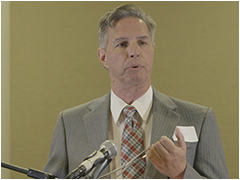
Dr. Tony Levatino, the MC for the CONVERTED conference [Photo by Spirit Juice Studios]
In November 1987, the Pro-Life Action League hosted its first “Meet the Abortion Providers” Conference.
This groundbreaking event featured doctors, nurses and administrators who left the abortion industry to become spokespersons for life. The League held five subsequent conferences between 1989-1995, from which two powerful video presentations created, Meet the Abortion Providers and Abortion: The Inside Story.
This year we decided the time was right to hold another such conference, providing a forum for another group of abortion clinic workers who have walked away from their jobs in the industry.
So on September 22, the League sponsored “CONVERTED: From Abortion Provider to Pro-Life Activist” at the Crowne Plaza O’Hare Hotel in Rosemont, Illinois, with eight speakers sharing their uniquely personal stories.
Master of Ceremonies Dr. Anthony Levatino began the day by briefly recounting his own conversion story, which he had shared in full for the first time ever at the League’s inaugural “Meet the Abortion Providers” conference in 1987.
Having graduated medical school in 1976, Levatino remarked, “I wouldn’t have hesitated to say I was pro-choice.” He began doing abortions as part of his OB/Gyn practice—eventually performing 1,200 of them—and didn’t begin to have doubts about abortion until he and his wife started considering adoption.
Eventually, they adopted a little girl named Heather, who tragically died after being hit by a car on June 23, 1984.
During the first D & E abortion he performed following Heather’s death, Levatino declared, “All I could see was somebody’s son or daughter, and after losing my own daughter, that was very painful.”
Still, he said, “Old habits die hard,” and he kept doing abortions for a time thereafter. He explained that his ultimate decision to stop doing abortions entirely was “strictly emotional and strictly selfish.”
Soon after, he was invited to attend at a pro-life pot luck dinner, and began speaking publicly on a limited basis. On the airplane ride to Chicago to speak at that first “Meet the Abortion Providers” conference in 1987, he says he had no idea what he was going to say. He ended up telling the story of Heather’s death—which he had previously never shared publicly.
Ruth Yorston: “Joining the Family Business”
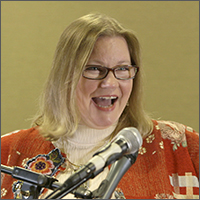
Ruth explained that she grew up in a “dysfunctional household” in a “strongly pro-abortion family.” Her family never talked about abortion while she was growing up, and Ruth never realized she was pro-choice until, at age 19, she took a job at an abortion facility—Fort Wayne Women’s Health Center—where her mother also worked.
When her mother offered her the job as a receptionist, she took it without hesitating, thinking: “What woman wouldn’t want to work alongside her mother?”
Ruth’s job was to welcome women and calm their nerves before abortion appointments. She soon realized she had no idea what an abortion was, but was afraid to ask questions.
Interestingly, Ruth explained that in the year that she worked at the abortion clinic, she never witnessed an abortion procedure, never saw a suction machine, nor did she ever meet the abortionist, George Klopfer (who still performs abortions there to this day).
While she was working at FWWHC, she began regularly attending an Evangelical Mennonite church that would consider itself pro-life. She noted, chillingly, “When I took a job at an abortion facility, it happened because we never talked about abortion in my church.”
Ruth would bring her bible to work with her and keep it on her desk, in full view of patients. She explained that in retrospect, it grieves her tremendously to know that women would have seen her bible on her desk and think to themselves that “God must think what they’re doing is OK.”
She soon after began dating a youth pastor, but didn’t immediately tell him she worked at an abortion clinic. When she ultimately did tell him, he wasn’t sure what to think. The next day, he gave her a book with pictures of ultrasound images and shared with her the truth that life begins at conception.
This so convicted Ruth that she quit her job the following week, telling her mother/co-worker, “I can’t do this anymore because I realize we’re killing children, and I can’t be a part of that.”
An Unlikely Planned Parenthood Employee

At the time Sue started her job in 1991, she didn’t know much about Planned Parenthood. She took the job because the pay was better than at other jobs she had been offered and because it was close to home.
At her job interview, the Planned Parenthood supervisor asked sue what she thought about abortion, and Sue replied, “Well, it’s murder. It stops a little beating heart.” Despite her candor, Sue got the job anyway.
Within a year, all Planned Parenthood facility managers in Iowa were required to go to an abortion clinic in Des Moines and observe a day of surgical abortions. That day, Sue watched between 25-30 surgical abortions, and was very uneasy about what she saw.
Yet she told herself that by working at a rural Planned Parenthood family planning clinic that did not itself perform abortions, she was helping to prevent surgical abortions.
Even though she believed life began at conception, she had always been “very radical” about her support for contraception.
Then came the Planned Parenthood regional meeting in Des Moines in 2008, when it was announced that every Planned Parenthood clinic in Iowa would begin offering “telemed” abortions, in which a doctor prescribes the RU-486 abortion pill remotely by webcam, without ever seeing his “patient” face to face.
With the introduction of telemed abortions, Planned Parenthood was going to require non-medical personnel like Sue to perform transvaginal ultrasounds on women to prepare them for their abortions.
When Sue expressed concerns about this and asked what qualifications were required, her supervisor replied curtly, “If you’re breathing, you can do it,” adding, “It helps if you’ve played a video game.”
Sue was also troubled that Planned Parenthood did not want it to be widely known that they would be doing these new telemed abortions. They would only tell women about that option once they were inside the Planned Parenthood facility and taken a positive pregnancy test.
Given her objections to abortion and her grave concerns about the safety and ethics of telemed abortion specifically, Sue told her older children that she wouldn’t be working there much longer. Not long after, Sue was fired from her job, which she considered a relief. She observed, “If you’re going to get fired from some place, Planned Parenthood is not a bad place to get fired from.”
Eventually Sue realized that God was calling her to become more actively involved in the pro-life movement in her community. So in the fall of last year, Sue and a small group of local pro-lifers held a 40 Days for Life prayer vigil outside the Planned Parenthood clinic she had managed for so long.
This past March, that facility closed its doors for good.
Linda Couri: “The Choice Driven Life”

Linda grew up in a “lukewarm cafeteria Catholic family,” but became an agnostic shortly after she started college. She said that she “valued freedom above all else,” and came to believe that Christians in general, especially Catholics, were “pathetic, shallow, and anti-intellectual.”
Linda explained that her first introduction to Planned Parenthood was as an 18-year old woman, at her first gynecological exam. At a time when she was very vulnerable, she began to trust the workers at Planned Parenthood, because, she said, “They were good to me.” As she put it, “Compassion led me to Planned Parenthood.”
After earning a Master’s degree in Social Work, she went to work as a counselor at a Planned Parenthood clinic in rural Illinois.
At age 24, while unmarried, Linda became pregnant, and although she was scared, she planned to have the baby. But when she realized she could have an abortion, she said, “It was like a miracle drug,” and all the stress she had been feeling about her pregnancy went away.
When she began to ask herself, “What about the baby?” she turned off that voice inside her head, because it felt so good to be rid of the stress. A week later, she had an abortion, and, she said, “I was fine.” Linda went on to say, “The pro-choice movement is fueled by millions of women who have had abortions.”
Admitting that she was never completely resolved about her own abortion, she strove to better understand how women respond emotionally after having an abortion. She began reading through journals that her Planned Parenthood facility provided women to write in following their abortions. To her great surprise, she found many anguished reactions like, “I’ve killed my baby,” and “Oh my God, what have I done?”
Soon after, Linda began to slowly return to Catholicism. She began seeing a spiritual director who advised her she should leave Planned Parenthood, which she eventually did.
After “not feeling a thing” for eleven years following her abortion, it finally hit her. She realized, “I’ve had an abortion. I’ve killed my child”—which caused her to have a panic attack and to feel “guilt and remorse to the very core of my soul.”
Describing her own conversion experience, Linda emphasized the principle of humility, noting how difficult it was to realize she was wrong, that she had become “anti-intellectual” and “shallow”—all of the things she had once thought Catholics were.
Abby Johnson Speaks about New Ministry to Abortion Workers
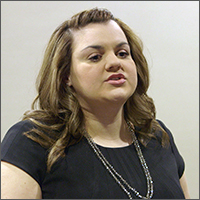
Speaking from her own personal experience volunteering and then working at Planned Parenthood for eight years, Abby described the very real spiritual warfare that abortion workers face, as well as the practical difficulties many face when they try to find another job.
She explained that it’s not enough merely congratulate them for leaving and let them fend for themselves. They need more than that, and her new ministry was created to help them.
Abby explained that when she quit Planned Parenthood, they responded with a lawsuit and tried to discredit her in the press. She believes this was meant as a warning to other employees not to “defect” like she did. And yet, many are.
Optimistically, she and her board of directors hoped that they might be able to help to bring 10 workers out of the abortion industry in their first year. Since June, they have already had contact with 30 people seeking to quit their jobs in the abortion industry.
But And Then There Were None aims to do more than help former abortion workers: “No abortion workers. No abortion clinics. No abortion.”
A “Wounded Healer” Speaks about God’s “Palpable Mercy”
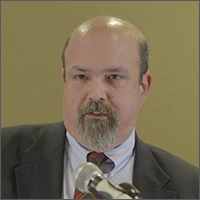
He admitted that he “bought the lie” that abortion and contraception were good for women, and he considers himself a “wounded healer.”
At the invitation of a friend in the medical field, he took a trip to Mexico City in 1987. During a visited to the Basilica of Our Lady of Guadalupe, he heard a voice saying, “Why are you hurting me?”—but he pushed the voice out of his mind. But then a few years later, while on another pilgrimage, he finally realized the need to turn his life around and re-dedicate himself to God.
In 1994, he founded the Tepeyac Family Center in Fairfax, Virginia, and in 2000, he started Divine Mercy Care. His practice places special emphasis on working closely with pregnancy resource centers and other areas of the pro-life movement to better serve women experiencing untimely pregnancies.
Bruchalski talked about a recent speaking tour of 42 medical schools across the United States, during which he found the vast majority of medical students were eager to listen to him.
He attributes this success both to the carefully worded titles of his presentations—like “How ‘Pro-Choice’ Are We?”—and his willingness to patiently listen to pro-choice medical students explain where they are coming from.
Bruchalski reiterated a point emphasized by many of the other conference speakers: “Conversions happen on God’s time when we make ourselves instruments of God’s love and mercy.”
Catherine Adair: From Planned Parenthood to Pro-Life
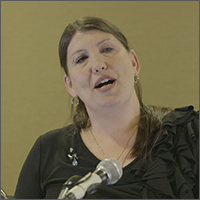
Much like Linda Couri, Catherine described having grown up in a lukewarm Catholic family. When she became pregnant at age 19, her mother’s response was, “Well, abortion is legal now.” And abortion is what she chose.
Catherine explained that her way of dealing with her abortion and all of the negative feelings associated with it was to plunge herself into “radical feminism.”
She explained that she sought work at Planned Parenthood precisely because she considered it a “badge of honor” that would demonstrate her pro-choice bona fides. At her interview, she was asked if she had a problem with abortion, and she said no.
Catherine then described being “eased” into actual hands-on involvement with abortion. Initially, her responsibilities at Planned Parenthood were limited to office work, then counseling. Only later did she assist with actual abortion procedures.
As a counselor, it was Catherine’s job to explain the abortion procedure to patients, including saying that the doctor would “gently extract the contents of the uterus.”
Although she had no medical training at all—her bachelor’s degree was in women’s studies—Planned Parenthood eventually classified her as a “medical assistant.” With this title, she determined when women were ready to go to recovery following their abortions.
Her turning point came when she saw a jar containing fetal arms and legs following a second trimester abortion. She was stunned, and soon after left her job. Catherine explained, “I didn’t leave because I became pro-life. I left because emotionally I couldn’t handle it anymore.”
She went on to earn a graduate degree in education, and although she never told anyone about working at Planned Parenthood, she still identified herself as “pro-choice” and “progressive.”
Once she and her husband started having kids, they started going church. When their parish needed a CCD teacher, Catherine volunteered, despite considering herself a hypocrite for not having gone to confession since high school.
She finally overcame her anxieties and made her confession, after which the priest asked her, “Do you know how much Jesus loves you?” Catherine knew God had forgiven her, but she didn’t feel forgiven. She later realized she had to ask God “by proxy” for forgiveness from the child she had aborted.
Conversion in the IVF Lab

For many years, he believed—along with most of the medical community—that in vitro fertilization (IVF) was a perfectly legitimate and morally acceptable way for infertile couples to become pregnant.
Though a lifelong Catholic, Dr. Caruso didn’t find the 1987 Vatican document Donum Vitae, which articulates the Church’s moral opposition to IVF, convincing.
But when the Vatican issued Dignitatis Personae in 2008, further clarifying the Church’s opposition to IVF, things began to change. Dr. Caruso found the latter document strongly convincing—both intellectually and morally.
By this time, Dr. Caruso and his family had begun attending St. John Cantius Parish in Chicago. He described having a three-hour long conversation shortly after joining the parish with one of the parish priests, who further explained the Church’s teaching.
Nevertheless, Dr. Caruso continued doing IVF. He ultimately ended up losing his job largely because he was “last hired, first fired.” To the surprise of his colleagues, he declared he was not upset about having lost his job. It was a relief.
Dr. Caruso then shared his vision of establishing the St. Anne Center for Reproductive Health, an OB/Gyn facility that would operate in accordance with the teachings of the Catholic Church.
He concluded by saying he has submitted himself to the will of God, which he likened to a roller coaster: “You never know where it’s going to take you: it goes up, it goes down, but eventually, where it ends up, it’s on His time.”
“Converted” Presentations Coming Soon
All who attended the CONVERTED conference were deeply moved by the stories they heard from all eight speakers—eight different ways the Lord reached into these practitioners hearts and brought them back to Him. Soon, those stories will be available to all.
The entire conference program was recorded, and League staff are now working to prepare them for an early 2013 release. Sign up for the League’s e-mail updates to get the word as soon as they’re available!
